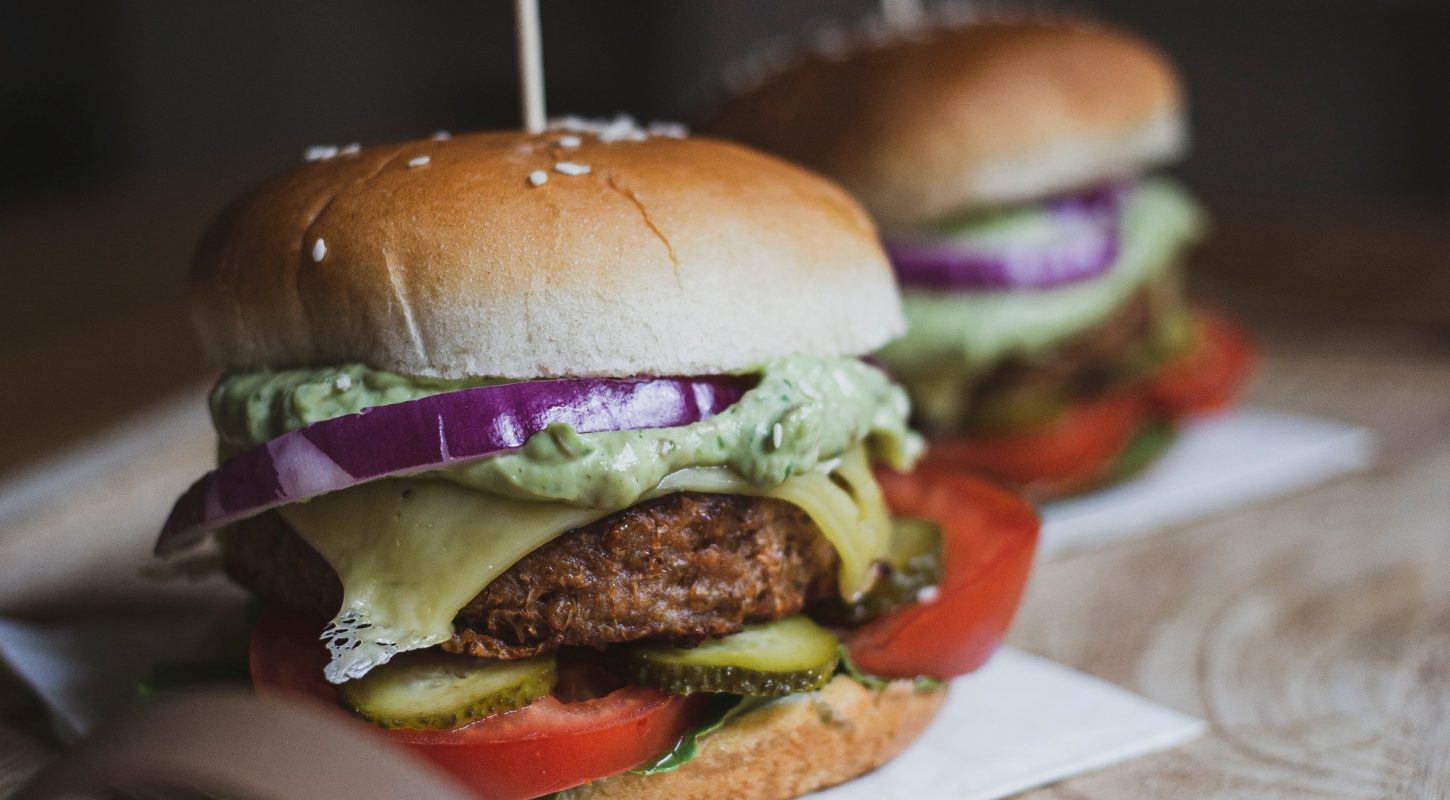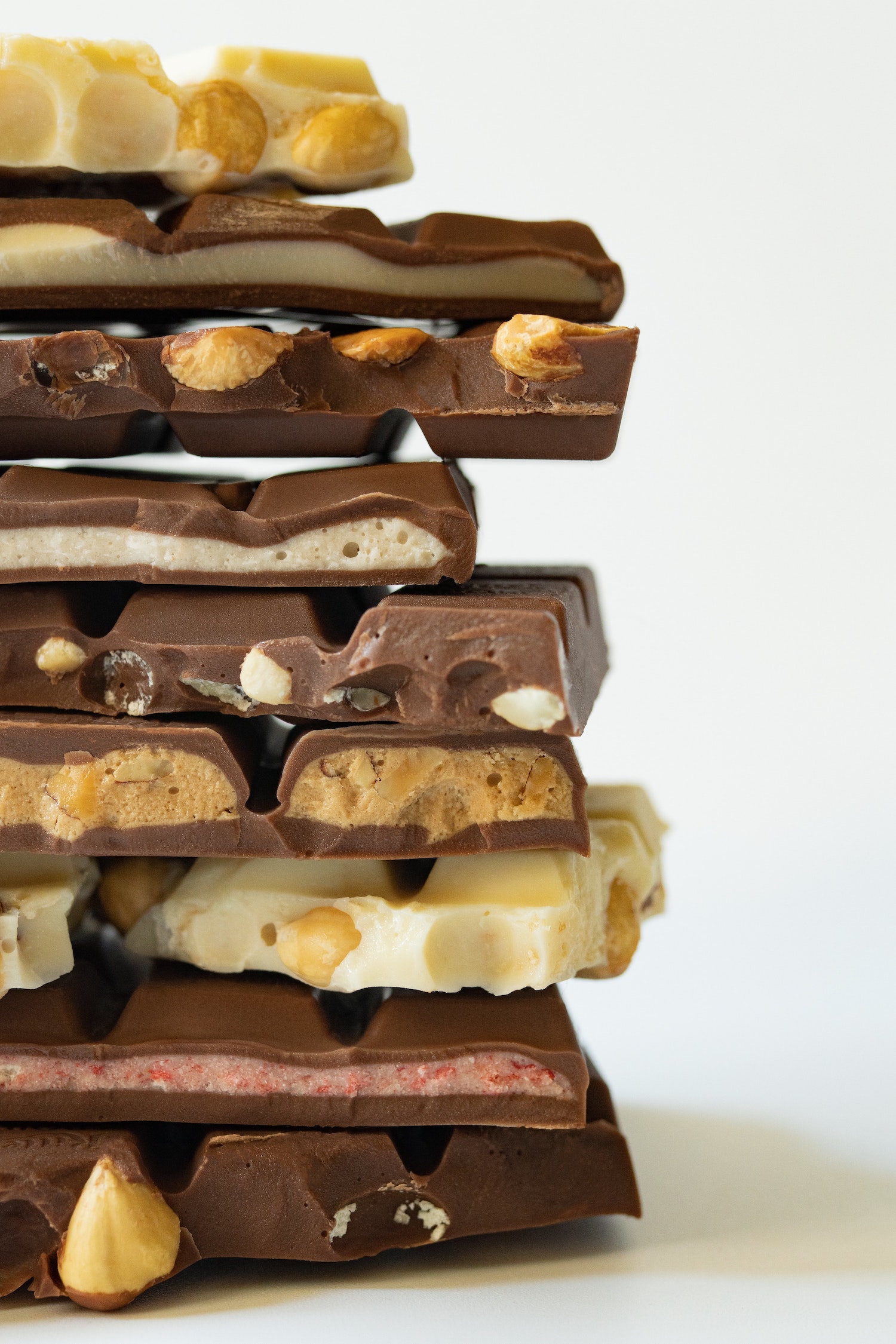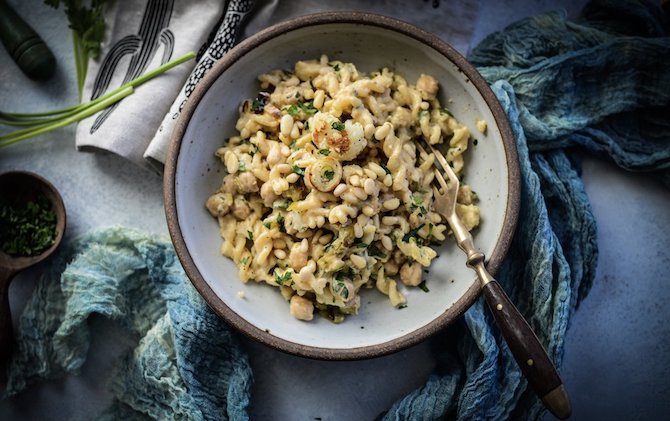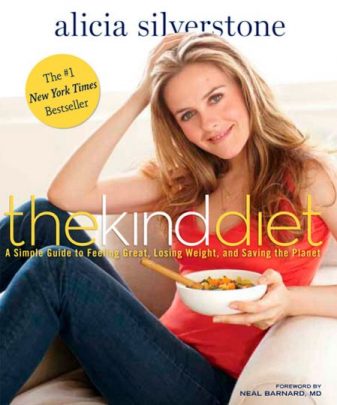Can a plant-based burger taste good and be good for you?
Plant-based burgers are everywhere these days. It is not unusual to see them in grocery stores or on the menu of your favorite vegan or nonvegan restaurants. In addition to fast food chains like Carl’s Junior and Burger King serving up Impossible and Beyond burgers even some mainstream steakhouse restaurants, like the Chart House, are including them on the menu. Initially, as a vegan, I was put off by the production of an all plant food that emulated the flesh of a murdered cow. I thought we should encourage “cold turkey” veganism. But it was Alicia who passed on to me that the concept, while flawed, overall is a good one, especially if it helps reduce meat consumption and therefore GHGs. More people are gobbling up plant-based burgers and some don’t even know it. My spouse, a meat eater, now prefers them. And current events like the closure of meat processing plants during the pandemic gave the plant-based alternative business an additional boost. So why not take a closer look at a food that could serve as an exit ramp from meat consumption?
While I recognize many readers will be at differing stages in their vegan lifestyle; anywhere from flirt all the way up to super hero, knowing about the plant-based burgers out there allows you to make informed choices, entice your meat eating friends and experiment with cooking and seasoning. I spent a fair amount of time in the kitchen preparing all the burgers covered in this article. They were prepared the same way: a patty on a thin wheat bun with a slice of fresh tomato and red onion, a squirt of catsup and a very modest sprinkle of salt free za’atar. I took a lot of notes while cooking, handling and shopping. A fair amount of research went into this as well, but in the end it was the eating that was most fun. My spouse was an excellent critic approaching each burger as if it was meat. She was brutally honest and we both agreed there was not one burger in the bunch that was disagreeable.
Each of the burgers reviewed here are available at many local grocery store, Whole Foods or other natural food stores. They can also be ordered online from the companies listed. Full disclosure: neither I nor Alicia have any financial ties to the food companies that make these plant-based burgers.
Texture and Moisture:
Animal meat has collagen fiber and muscle which holds a burger patty together. Fat in an animal burger gives it moisture and it stays solid at room temperature due to its saturation. Plant fats are largely unsaturated fats and therefore are liquid at room temperature. To bind plant-based burgers coconut and other oils, which tend to be solid at room temperature, are used. All the fats used in these meat alternatives melt at lower cooking temperatures than animal fat which is why plant-based burgers need only cook for a short period of time. If cooked for too long they can lose their moisture.
Color: most plant-based burgers have beet extracts and/or annatto added that gives the burger its red tinged center and “bloody” juice. The Impossible Burger goes a step further using soy derived leghemoglobin, an oxygen carrying substance found in the roots of soybean plants.
Workability: The true art to preparing and serving a plant-based burger is in the cooking. J. Kenji Lopez-Alt wrote an excellent article on the art of cooking plant based meat. I have found the key to handling most plant-based burgers is to take them immediately from refrigerator to the pan, otherwise they become very mushy and difficult to handle. Stay attentive as you cook them as they really only need some browning on both sides. Don’t press the burger as it cooks, this adds to loss of moisture. If over-cooked a plant-based burger will become dry and lose its umami, that meaty flavor that draws us to burgers in the first place.
Taste: I think next to nutrition this is one of the most important considerations when selecting a plant-based burger or patty. Let’s face it when we eat we want to experience a wide range of tastes: salty, bitter, sweet and sour. Umami, derived from the Japanese word for delicious, is our “fifth taste.” It is through umami that we crave rich flavors like the amino acid gluatamate. Most plant-based burger manufacturers have focused their recipes on appealing to umami. And by and large it works.
Nutrition: My decision to become a vegan was based largely upon a desire to eat more holistically, healthier. So, the nutritional content of plant-based burgers is important to me. That includes calories, percent saturated fats, sodium, carbohydrates, protein, vitamins and fortified micronutrient ingredients. The majority of plant-based burgers have pea or soy protein added. Some use wheat gluten. The most common fat source is coconut oil which allows for marbling while binding the ingredients together. Nearly all of them are high in sodium content. The amount of key micronutrient ingredients in each plant-based burger varies making some burgers more beneficial than others. The majority are non-GMO. Some are fortified with Thiamine and B12, vitamins with a predominantly animal origin. The table below summarized the key nutritional content of the burgers discussed here and compares them with the nutritional content of a beef burger.
Impossible (Impossible Foods, Redwood City, CA) by far one of the best known meat alternative burgers. It is oily but moist and very textured with a taste and feel of a beef burger. It is the only burger in this group that is fortified with B vitamins. But it is also the only burger to use some GMO ingredients: GMO modified soy and a yeast amplification process of producing “heme” from soy root.
- Fat source: Coconut and sunflower oil
- Protein source: soy protein concentrate, potato protein and yeast extract
- Fortified: with Thiamine, Niacin, Folate, Riboflavin. B6 and B12
Beyond (Beyond Meat, El Segundo, CA) Next to Impossible this burger has a near beef burger taste and texture. It is moist and when cooked properly juicy. But it does leave the eater with a bit of an after taste.
- Fat source: Coconut and canola oil
- Protein source: pea, mung bean and rice protein
Uncut (Before the Butcher, San Diego, CA) This burger got the highest rating from my meat eating spouse and I have to agree. Its texture and moisture were spot on and it left no after taste as some plant-based burgers do. The umami was near perfect and I am not just saying that because this burger is from my home town! Of all the burgers reviewed Uncut had the lowest sodium content.
- Fat source: Coconut and canola oil
- Protein source: Soy protein concentrate, extract and flour, yeast extract
Awesome (Sweet Earth, Moss Landing, CA) this burger generates less cooking fat than the rest but is just as moist to eat. It did not dry out while plated. The texture of the “meat” is more homogeneous, with great taste and a softer umami flavor than other plant-based burgers.
- Fat source: Coconut and canola oil
- Protein source: Pea protein, wheat gluten and malted barley
Lightlife (Turners Falls, MA) At 40 years old LightLife is one of the oldest plant-based food companies in the US and by no means are they kicking back. This burger uses coconut oil to emulate the marbled burger-like texture so it generates cooking fat like Impossible, Beyond and Uncut. Not as much umami as UnCut or Awesome but the taste does not disappoint, it simply differs. This burger has a pleasant flavor most likely due to the added spices making it slightly sweet. It maintains good moisture while plated.
- Fat source: Coconut and canola oil
- Protein source: Pea protein
FieldBurger (Field Roast, Seattle, WA) this is another whole burger animal entirely (no pun intended). In the company’s own words “they raise the bar on the antiquated hockey puck veggie burger we all know so well.” Made from whole vegetable and grain ingredients the texture and taste does not even try to be that of a beef impersonator. It is moist, smooth and has a distinct vegetable taste while being healthy. This burger has its own unique taste that merits a bun and other burger accoutrements such as vegan mayo or a small drizzle of tahini dressing (pg 259, The Kind Diet).
- Fat source: Palm fruit and safflower oil
- Protein source: Wheat gluten and wheat protein, pea protein, yeast extract
Incogmeato (Morning Star Farms, Kellogg): an 8.5 oz burger that like Impossible is fortified with B12 and thiamine. This new comer to the Morningstar family is quite unlike their Spicy Black Bean patty. First, it contains no milk calcium caseinate or egg whites a nod to the vegan diet. The moisture and texture of this burger is very much like a beef burger without being too oily. Incogmeato has a hint of smoky flavor that enhances its burger replicating umami.
- Fat source: Canola and palm oil
- Protein source: soy protein concentrate, Yeast extract.
- Fortified: with Thiamine and B12
Read the Nutrition table for all these burgers!
Plant-based burgers and other meat substitutes are increasingly popular. Consumers have adopted them for a number of reasons such as climate change mitigation, to stop animal suffering and as healthy dietary choices such as flexitarian, vegetarian and vegan. Compared with beef burgers they are lower in sodium, have no trans fats and no cholesterol. They are calorically equivalent to beef. The majority of plant-based burgers provide reasonable protein from a variety of sources. But they are high in sodium, the leading contributor to high blood pressure with downstream impacts on cardiovascular and kidney disease. While most have limitations in micronutrients such as iron, zinc and Vitamin B12 those shortfalls can easily be overcome through dietary supplements.
My approach toward plant-based burgers is two-fold. If I am looking to replicate the taste and texture of a beef burger or if I am feeding a meat eater, then I go with Uncut, Awesome, Incogmeato or Beyond as my choices, in that order. But if I am looking for the healthiest, low sodium burger choice out there then I go with the Uncut burger or my own recipe for black bean burgers. The take home message here is to know the ingredients of these meat alternatives and consume them in moderation.
This is by no means an exhaustive list of plant-based burgers, nor is it nutritionally encyclopedic. This is a start, a place holder, for further discussion about the pros and cons of plant-based burgers and “meat.” New plant-based burgers are popping up all the time as demand for the meat alternatives increases. I invite you to share your plant-based burger opinions and recommendations.
Dr. Eileen Natuzzi works as a General and Trauma Surgeon in San Diego and Bakersfield, California. For the first 15 years of her career, Dr. Natuzzi’s practice focused on treating vascular disease where she saw first hand the cumulative vascular damage that results from our animal fat diets and unhealthy choices. She recently obtained a Master in Public Health in order to become more involved in a preventive approach toward health.




